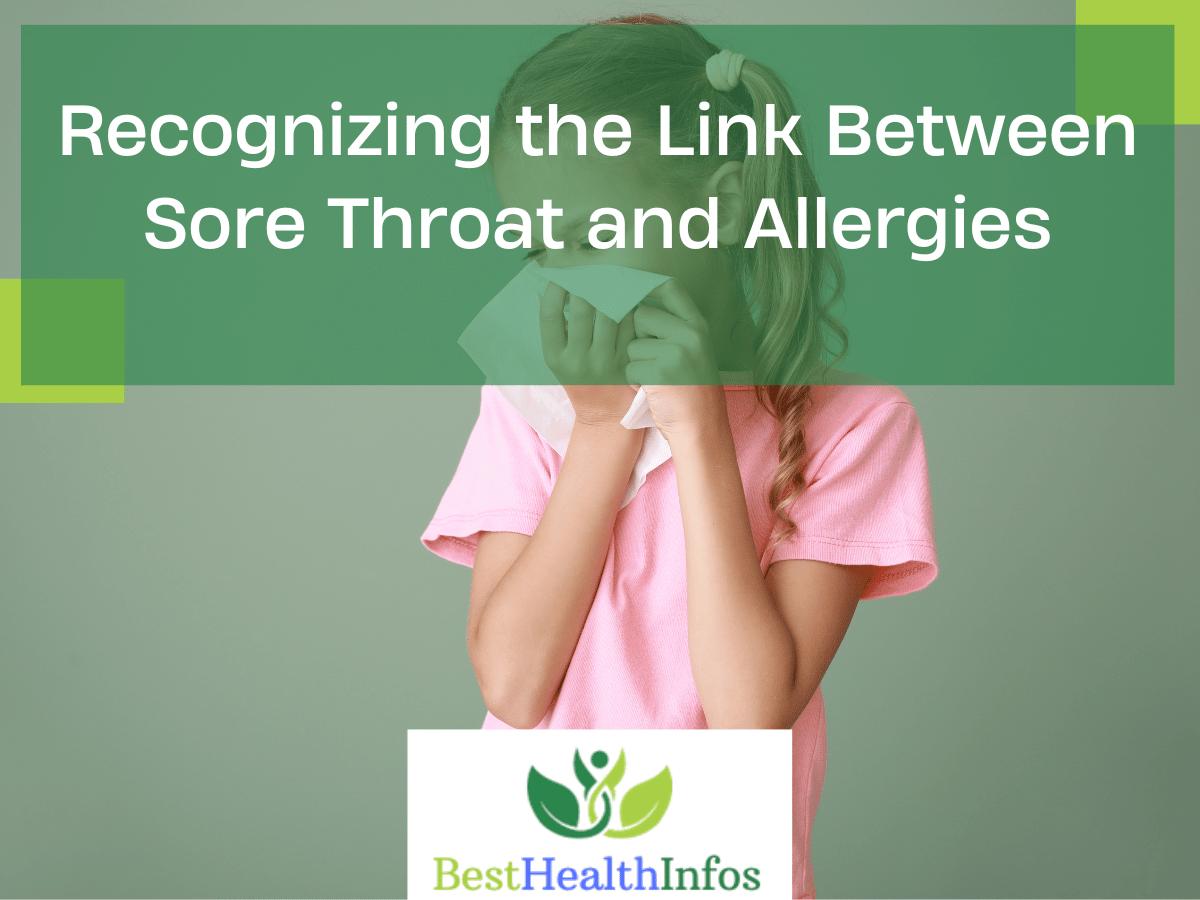A major worldwide health issue that affects millions of individuals is allergies. These hypersensitive reactions happen when the immune system perceives a chemical that is usually harmless as a danger, setting off a series of actions intended to eradicate the purported intruder. Sore throat is one of the overlooked secondary effect of immune responds, and it is associated to many diseases.
However, sore throats are very common conditions and can be attributable to many issues including allergies, bacterial infections and irritants. In this study, we examine the intricate relationship between allergies and sore throats, illuminating the mechanisms that bind these two seemingly unconnected issues.
Kinds of Allergies
Allergies come in various forms with distinct causes and manifestation. Respiratory health is greatly compromised by common allergies to environmental factors including molds, dust mites, and pollens. Food allergies, resulting from negative reaction of a body to certain dietary proteins can also be counted as one of the forms of this spectrum. And pet allergies, that can originate from pet dander, containing specific proteins is the second form of this spectrum.
Related: Do Allergies Cause Body Aches?
These allergens then trigger the immune system, which in turn releases histamines and other molecules causing the symptoms like congestion, sneezing and itching. While the respiratory system is the main target of these responses, the throat serves as a secondary battleground for certain individuals.
| Type of Allergy | Triggering Allergens | Common Symptoms |
| Environmental Allergies | Pollen, Dust Mites, Mold | Sneezing, Nasal Congestion, Throat Irritation |
| Food Allergies | Proteins in Certain Foods | Swelling, Itching, Digestive Issues |
| Pet Allergies | Proteins in Pet Dander | Sneezing, Runny Nose, Throat Irritation |
Identifying Allergy-Related Symptoms
Finding symptoms associated with allergies entails identifying a variety of indicators that may impact various bodily areas. Below is a thorough explanation of typical symptoms associated with allergies:
Acute Airways Complaints:
- Sneezing: Sudden, frequent fits of sneezing.
- Nasal congestion or excessive discharge may cause a runny or stuffy nose.
- Blockage or stuffiness in the nasal passageways is known as nasal congestion.
- Itchy or Watery Eyes: Eyes that itch excessively or tear too much.
- Coughing: A chronic cough that is often dry or produces little phlegm.
Throat Signs:
Sore Throat: A sore, painful, or scratchy throat.
Tickling or discomfort in the throat is known as throat irritation.
Uncomfortable itching feeling in the throat is known as “itchy throat.”
Excess mucus dripping down the back of the throat is known as postnasal drip.
Skin Conditions:
- Red or Itchy Skin: Skin might become red, irritated, or break out in an itchy rash.
- Welts or Hives: Elevated, red, scaly lesions on the skin’s outer layer.
- Eczema flare-ups: A worsening of the eczema that already exists or the formation of new areas.
Indigestion-Related Symptoms: - Vomiting or feeling queasy are examples of nausea.
- Throwing up: Expelling stomach contents with force.
- Watery or loose feces indicate diarrhea.
- Pain or discomfort in the region of the stomach called abdominal pain.
Generalized Symptoms:
Fatigue: A general state of weariness or lethargy.
Headache: A headache is head pain or discomfort.
Generalized Discomfort: A generalized feeling of discomfort or malaise.
Anaphylaxis, a severe allergic reaction:
- Breathing problems including dyspnea, tightness in the chest, and dyspnea.
- Face or Throat Swelling: Face swelling, especially around the lips and eyes.
- Abnormally high heart rate, or rapid heartbeat.
- Dizziness or Fainting: Experiencing vertigo or becoming unconscious.
Understanding the nature of allergic responses requires being able to recognize certain symptoms and their patterns. For a precise diagnosis and suitable treatment, it’s best to speak with a healthcare provider if you have severe symptoms or suspect allergies.
Related: Can Allergies Cause a Cough? Symptoms, Signs, and Causes
The Allergy and Respiratory System
The respiratory system is most affected by allergies, and here is where the symptoms most often manifest. Sneezing fits, throat inflammation, and nasal congestion are frequent indicators that the immune system is on high alert. Because the throat and nasal passageways are related, inflammation in one place may quickly travel to the other.
The body mounts an immunological reaction to allergens because it views them as dangers when breathed. When it comes to airborne allergens like pollen, the respiratory system goes into defense mode. The immune system’s attempt to neutralize the perceived threat may result in inflammation or irritation of the throat, which is a necessary part of this system.
| Immune Response | Common Symptoms | Targeted Areas |
|---|---|---|
| Release of Histamines | Itching, Sneezing, Congestion | Nasal Passages, Throat |
| Inflammation | Throat Irritation, Soreness | Respiratory Tract |
Painful Throat with Postnasal Drip
Postnasal drip is a major factor in the relationship between allergies and sore throats. This happens when the back of the throat becomes overabundant with mucus that is generated in reaction to allergies. A constant scratchy or uncomfortable sensation in the throat might result from mucus constantly trickling down it.
In addition to being an allergy symptom, postnasal drip plays a major role in the onset of sore throats. Mucus builds up in the throat, creating the perfect habitat for germs to proliferate and can cause secondary infections that worsen sore throats.
A painful throat and allergic rhinitis
Hay fever, sometimes referred to as allergic rhinitis, is a common allergic reaction that affects the throat and nasal passages. Seasonal variations are often accompanied by this illness, with times of high pollen activity exacerbating symptoms. The symptoms of sore throat, which include runny nose, sneezing, and nasal congestion, might worsen due to allergic rhinitis.
Rhinitis brought on by allergies causes inflammation of the nose and throat passages. Constant mucus flow sets up an inflammatory response that makes the throat more prone to infection and discomfort. For those who suffer from allergic rhinitis, controlling the illness becomes essential to reducing discomfort in the throat and nose.
| Allergic Rhinitis Symptoms | Impact on Throat |
| Sneezing | Throat Irritation and Soreness |
| Runny Nose | Postnasal Drip, Contributing to Sore Throat |
Food allergies that causes sore throat
Anxiety caused by certain foods might aggravate sore throats. Typical food allergies that might irritate the throat include:
- Nuts: It is well known that allergies may cause irritation in the throat in those who are sensitive to peanuts and tree nuts.
- Shellfish: Symptoms of an allergic response to shellfish, such shrimp, crab, or lobster, might appear in the throat.
- Milk: Cow’s milk contains proteins that some individuals are sensitive to, which may cause allergic responses like sore throats.
- Eggs: Sensitive people may have pain and swollen throats due to egg allergy.
- Wheat: Sore throat is an indicator of allergic reactions in people who may be sensitive to wheat’s proteins.
Remember allergic reactions do not give only a sore throat as symptom. However, in case you suspect you might have a food allergy, visit a healthcare professional for accurate diagnosis and follow up measures. For the purpose of pinpointing the precise cause, they could advise allergy testing or an elimination diet. If there are symptoms of a severe allergic response (anaphylaxis), such as breathing difficulties or swelling of the face and neck, you may need to get medical help very once.
Control and Preventive
Preventing and treating the related sore throat is mostly dependent on controlling allergies well. Decongestants, nasal corticosteroids, and over-the-counter antihistamines may all help by lowering inflammation and inhibiting the immune system. It’s critical to choose drugs based on each patient’s unique symptoms and, if necessary, seek medical advice.
Apart from pharmaceutical interventions, changes in lifestyle may be very influential in averting allergic responses and the consequent pain in the throat. Reduce the frequency and severity of allergy responses by putting allergen avoidance tactics into practice, such as utilizing air purifiers, keeping your home clean, and avoiding known triggers.
To further reduce allergy exposure, adopt strategies like routinely cleaning linen, using pillow and mattress coverings that are allergen-proof, and closing windows during the busiest pollen seasons. By using allergy testing to identify certain triggers, focused avoidance techniques may be developed, offering a customized strategy to treating allergies and averting bouts of sore throat.
| Approach | Examples |
| Over-the-Counter Medications | Antihistamines, Decongestants, Nasal Corticosteroids |
| Lifestyle Modifications | Allergen Avoidance, Air Purifiers, Clean Living Space |
| Allergen Avoidance Strategies | Regular Bedding Washing, Allergen-Proof Covers, Controlled Environment |
When to Seek Medical Assistance
While many instances of allergies and sore throats may be managed with over-the-counter drugs and lifestyle changes, there are certain circumstances that need medical attention. Seeing a doctor is crucial if symptoms worsen, linger longer, or are accompanied by other concerning symptoms like fever, dyspnea, or a chronic cough.
Prescription drugs or allergy immunotherapy may be necessary in some situations to treat underlying immune system problems that result in chronic allergic responses. Finding and treating the underlying cause of allergies may help provide long-term comfort and lower the chance of recurring bouts of sore throat.
| Signs and Symptoms | Action |
| Persistent or Worsening Symptoms | Consult a Healthcare Professional |
| Additional Concerning Signs | High Fever, Difficulty Breathing, Persistent Coughing |
| Professional Medical Guidance | Prescription Medications, Allergy Immunotherapy |
Conclusion
In summary, the complicated relationship between allergens and sore throats reveals a complex interaction between the respiratory system’s components. Those who are aware of how allergens cause immunological reactions and contribute to sore throats are better equipped to manage their allergies proactively.
A multifaceted strategy that incorporates medication, lifestyle modifications, and expert medical supervision when needed may help people manage the difficulties associated with allergic responses and lessen the effect on their throat health. Ensuring a thorough and efficient strategy to treating allergies and preserving general respiratory health requires being aware of the warning signals of chronic symptoms and knowing when to seek medical assistance.
Sources:




2 thoughts on “Recognizing the Link Between Sore Throat and Allergies”